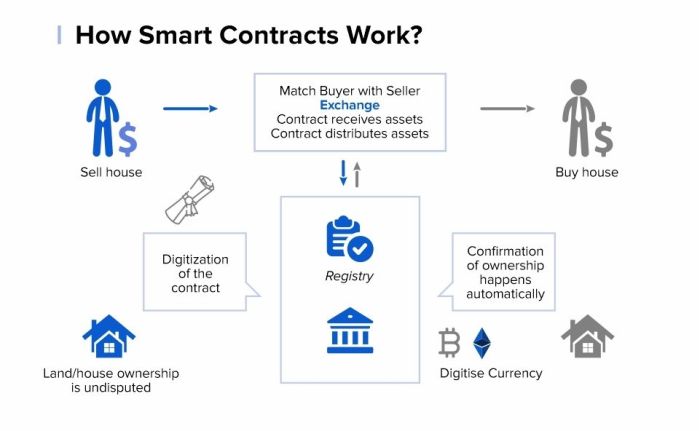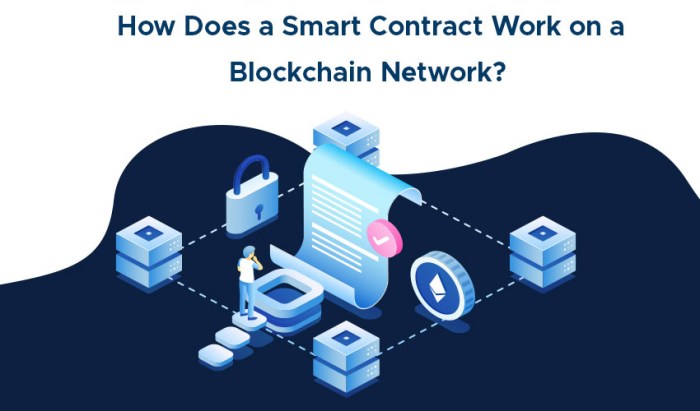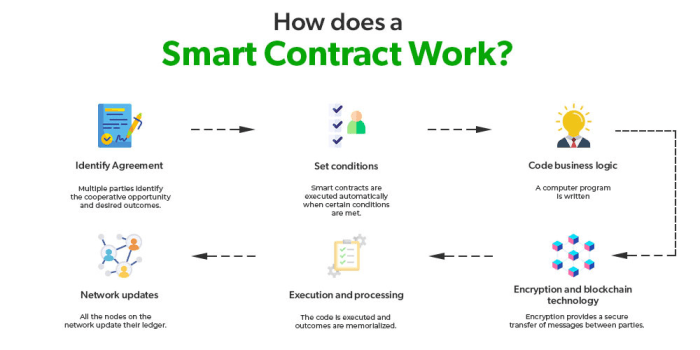What is a Smart Contract and How Does It Work sets the stage for this enthralling narrative, offering readers a glimpse into a story that is rich in detail with american high school hip style and brimming with originality from the outset.
Smart contracts, the buzzword of the digital age, are revolutionizing how agreements are made and executed. Brace yourself for a deep dive into this cutting-edge technology that is reshaping the way we do business.
What is a Smart Contract?

A smart contract is a self-executing contract where the terms of the agreement between the buyer and seller are directly written into lines of code. These contracts are stored on a blockchain network and automatically execute actions when predefined conditions are met.
Key Features of Smart Contracts
- Immutable: Once deployed on the blockchain, the code cannot be altered or tampered with.
- Self-executing: Smart contracts automatically execute actions without the need for intermediaries.
- Decentralized: Smart contracts operate on a decentralized network, removing the need for a central authority.
Examples of Smart Contracts in Different Industries
- In finance: Smart contracts are used for automated loan agreements and insurance claims processing.
- In real estate: Smart contracts can facilitate property sales, rental agreements, and escrow services.
- In supply chain management: Smart contracts help in tracking goods, verifying authenticity, and automating payments.
Benefits of Smart Contracts Compared to Traditional Contracts
- Efficiency: Smart contracts eliminate the need for manual processing and reduce the possibility of errors.
- Transparency: All actions on the blockchain are visible, providing transparency and reducing disputes.
- Cost-effective: Smart contracts reduce the costs associated with intermediaries and paperwork.
How Does a Smart Contract Work?

Smart contracts are self-executing contracts with the terms of the agreement directly written into code. Let’s dive into the details of how these innovative contracts operate and facilitate transactions.
Creating a Smart Contract
Smart contracts are created using programming languages like Solidity, specifically designed for writing smart contracts on blockchain platforms such as Ethereum. The code Artikels the rules and conditions of the contract, including the actions to be taken automatically once those conditions are met.
Role of Blockchain Technology
Blockchain technology plays a crucial role in enabling smart contracts by providing a secure and decentralized platform for executing transactions. The blockchain ensures transparency, immutability, and security by recording all contract details on a distributed ledger. This eliminates the need for intermediaries and reduces the risk of fraud.
Automation Capabilities, What is a Smart Contract and How Does It Work
Smart contracts automate the execution of agreements, removing the need for manual intervention. Once the predefined conditions are met, the contract automatically triggers the agreed-upon actions. This automation streamlines processes, reduces errors, and enhances efficiency in various industries like finance, real estate, and supply chain management.
Execution of a Transaction
- Step 1: Initiating the Transaction – Parties involved initiate the transaction by interacting with the smart contract.
- Step 2: Validation – The contract verifies the conditions set in the code to determine if the transaction can proceed.
- Step 3: Execution – If the conditions are met, the contract automatically executes the transaction as per the agreed terms.
- Step 4: Recording on the Blockchain – The details of the transaction are recorded on the blockchain, ensuring transparency and security.
- Step 5: Completion – Once the transaction is executed, the parties involved receive the results without the need for intermediaries.
Components of a Smart Contract

Smart contracts consist of several essential components that work together to automate the execution of agreements. Understanding these components is crucial for developing and implementing smart contracts effectively.
1. Code
Smart contracts are essentially self-executing contracts with the terms directly written into lines of code. The code dictates the rules and conditions of the contract, ensuring that all parties involved adhere to the agreement. This code is immutable, meaning it cannot be altered once deployed, providing security and trust in the contract’s execution.
2. Logic
The logic within a smart contract defines how the contract will operate and what actions will be taken based on predefined conditions. This logic is encoded into the contract’s code, allowing for automated and transparent execution of the agreement without the need for intermediaries.
3. State
The state of a smart contract refers to the current condition or status of the contract at any given time. It includes variables, data storage, and the overall state of the contract’s execution. The state is updated as the contract interacts with external inputs and triggers predefined actions based on the contract’s logic.
4. Signatures
Signatures play a crucial role in smart contracts by ensuring that all parties involved in the agreement have authorized the contract’s terms. Signatures are used to validate transactions, verify identities, and provide a level of security and authenticity to the contract. These signatures are essential for enforcing the terms of the contract and ensuring compliance.
Programming Languages for Smart Contracts
Popular programming languages used to create smart contracts include Solidity, which is specifically designed for Ethereum blockchain smart contracts, and Vyper, a more secure and Pythonic alternative to Solidity. These languages allow developers to write the code that defines the behavior and logic of the smart contract, enabling the automation of agreements in a decentralized and secure manner.
Security and Trust in Smart Contracts: What Is A Smart Contract And How Does It Work
Smart contracts offer a high level of security and trust due to the use of cryptographic techniques to ensure the integrity of the contract. Unlike traditional contracts, smart contracts are executed automatically without the need for intermediaries, reducing the risk of fraud and manipulation.
Role of Cryptography in Smart Contracts
Cryptography plays a crucial role in smart contracts by encrypting the information stored in the contract and ensuring that it cannot be altered without proper authorization. This helps in maintaining the security and privacy of the contract participants and prevents unauthorized access to sensitive data.
Comparison of Trust in Traditional vs Smart Contracts
In traditional contracts, trust is heavily reliant on the reputation and integrity of the parties involved, as well as the legal system for enforcement. On the other hand, smart contracts operate on a trustless system, where trust is established through code and encryption mechanisms, making the process more transparent and secure.
Importance of Secure Smart Contracts
Real-world incidents such as the DAO hack in 2016, where a vulnerability in the smart contract code led to the theft of millions of dollars, highlight the critical importance of secure smart contracts. Implementing robust security measures and conducting thorough auditing can help prevent such incidents and ensure the integrity of smart contracts.


